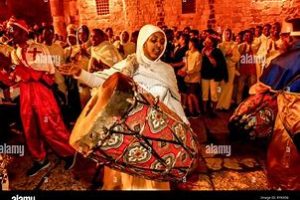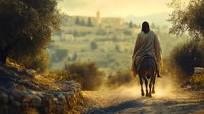
Irreechaa is one of the cultural values of the Oromo people’s Gada system and it is a celebration of gratitude to the Creator. It celebrates the “widespread” subordination of man to his creator as a natural law. In other words, it celebrates the renewal of connection or bond with nature. It is not a religion by itself. It primarily promotes reconciliation, forgiveness, union, love, and peace among the nations and nationalities of Ethiopia.
Irreechaa is held twice a year. Irreechaa Malkaa is the first one. This is a festival celebrated in September. It is a day of thanksgiving to Waaqa Tokicha (one Creator) for the lush grass so the natural law of Malkaa can be kept undisturbed and balanced in the future. The people of Oromo are grateful to the Waaqa (Creator) for the rain during the winter months. The people then plead with the Creator to keep the sprouts safe from any natural disaster. Then they enter the barn safely.
Irreechaa Tulluu is the second event or festival. This takes place when the summer months come to an end and autumn sets in. The Oromo people go climb a nearby mountain and ask the Creator to give them rain for the coming winter and make the months’ abundant harvest time.
Irreechaa is celebrated for two big reasons. First, it is to give thanks for the good that the Creator has done for mankind, and second to plead for what is desired to happen in the future. In the meantime, the people of Oromo are grateful to the Waaqa/Creator who allowed them to endure the harsh winter months. They also ask for forgiveness, for mankind is always not right. God is the one to be praised for creating all things and making it possible for mankind to survive the hardships of winter. Thus, the Oromo people bless the year by saying, “May the year be one of peace, love, success, and prosperity.”
The women also sing the following melody and go to give thanks.
Mareehoo, mareehoo, mareehoo; it turned around and came back
Alaa mana nuuf toli yaa ayyoleehoo; All the best inside and out
Mareehoo, mareehoo, mareehoo; It turnaround and came back (3)
Mee nutti araarami yaa ayyoleehoo; Oh almighty lord please forgive us
When the men return from Irreechaa, they will return to Gabbisayhoo.
Gabbisayyoo hoo… hoo… roobee biyya gabbisee
Gabbisayyoo hoo.. hoo… roobee biyya gabbisee
Gabbisayyoo hoo… hoo roobii lafa nuuf ga’i,
Gabbisayyoo hoo… hoo yaa Waaqi ati nuuf nahi…
They say “This is a message that we have succeeded and that we will be back in peace”.
In the Irreechaa Tradition and during its ceremonials, it is forbidden to go out for Thanksgiving with resentment and hatred as well as to enter the place of Irreechaa before the appearance of Abbaa Gadaa. The place of Irreechaa is noble so it is strictly prohibited to dump dirt on or near it. It is also not allowed to go out at night to celebrate Irreechaa for it is out of tradition and is not customary. The tradition still prohibits going out in the winter to celebrate, where the rivers are still muddy-yellow. In addition, men are not allowed to wear jewelries made from seashells, and girls are not to carry Sinqee, it’s forbidden. Finally, one cannot go to celebrate Irreechaa without lush grasses.
The traditional practices of the Oromo people are of great importance for solidarity and brotherhood. Through tradition and adoption, the Oromo people have long lived together by inheriting their cultural values, sharing their wealth and possessions with others, and strengthening relationships. It is customary for the people of Oromo that little ones must respect and obey the elderly and live together in brotherhood.
The festival of Irreechaa encourages those who have gone out for a cause to return with a pure heart and mind to thank their Creator and strengthen their unity and brotherhood. Participants from different places for the ritual of Irreechaa are welcomed without exception but with love and unity. Thanking each other and participating together, having fun and spending time, getting to know each other all throughout the festival, help to exchange culture and strengthen brotherhood and unity.
The Irreechaa festival is a celebration of joy that people come out and celebrate together regardless of age, gender, religion, opinion or standard of living. Therefore, Irreechaa is a platform to express and renew unity, brotherhood, love, national pride, history and culture. For the Oromo, religious and cultural diversity is a classic demonstration of its beauty and unity. That is why it is said, the Irreechaa festival is becoming an ideal platform in terms of strengthening the unity of the Oromo people and its brotherhood with other ethnicities.
Furthermore, Irreechaa is a forum for reconciliation and solidarity. Its values are primarily linked to peace and reconciliation. Before the Irreechaa festival, the Abbaa Gadaa’s and the elders of the country go to the local areas to resolve grievances and disagreements among the community, ask for forgiveness, and decide compensation if there is bloodshed. As mentioned earlier, it is morally sanctioned to go to Irreechaa with resentment and without reconciliation. Irreechaa is preached with a clear heart and a clear mind, without resentment or grudges.
Wherever the Irreechaa takes place, it is a place of peace and reconciliation. Have you ever forgiven one another for the sake of gratitude? Are you at peace with each other? Have you ever had a relationship with the Creator? The elderly or Abbaa Gadaa’s ask during the ritual. Even if there is a lack of reconciliation in the area, people will apologize and forgive one another at this time. Therefore, whoever comes out with green grass for thanksgiving will put away resentment and hatred and preach and proclaim peace, brotherhood, love, unity, hope, prosperity as well as extend good wishes.
During the festival, people sing, praise, and pray to the lord for the peace and love of their family, neighbors, and humanity in general. This indicates that Irreechaa is a symbol of reconciliation.
Festivals such as Irreechaa play an important role in bringing about a cultural renaissance. Irreechaa plays a role in the cultural renaissance movement, being an outdoor festival attended by many participants, who are decorated with various costumes and ornaments.
The costumes are worn on the day of the festival, the ornaments are to be adorned, and the objects of honor to be held, the line-up and manner of the participants, and the songs and dances are all attractive. It is enticing to watch women walk in front of Abbaa Gadaa’s and other participants, chanting, holding lush grasses, adorned with traditional costumes and ornaments. Culture and beauty are seen together, creating motivation to express one’s own culture and identity. Especially recently, the celebration of the Irreechaa festival has encouraged young people to know and celebrate their culture, to be proud of who they are.
BY NAOL GIRMA
THE ETHIOPIAN HERALD THURSDAY 3 OCTOBER 2024





